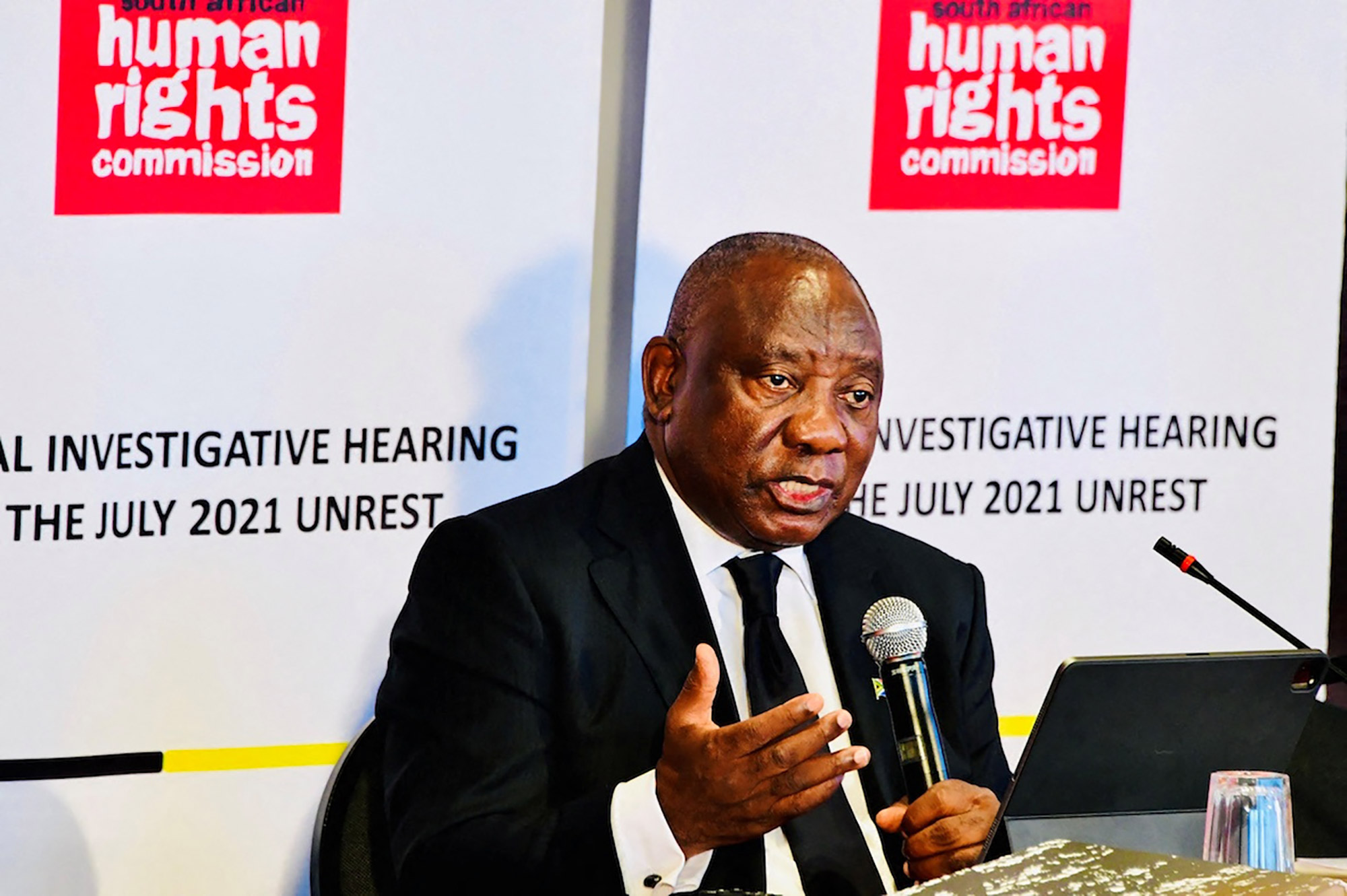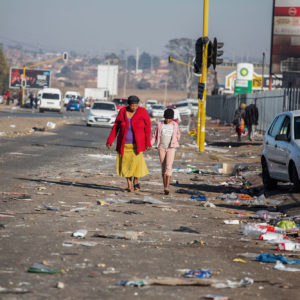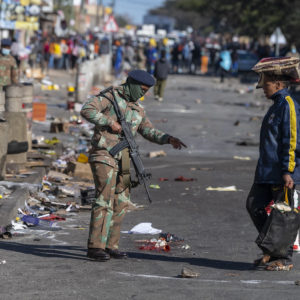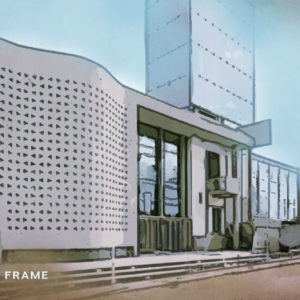Promises at hearings on July riots ring hollow
For the communities still reeling from the devastating effects of last year’s turmoil, the president’s testimony and the undertakings he made hold no hope for either peace or justice.
Author:
8 April 2022

Despite President Cyril Ramaphosa’s promise that those responsible for the violent and destructive unrest in July 2021 will be brought to book, residents in Durban communities hit hard by last year’s July unrest are sceptical that the police will be able to accomplish this. And, they say, programmes to promote peace between communities that experienced racist violence have come to nothing.
Ramaphosa testified in Johannesburg on 1 April at the last hearing held by the South African Human Rights Commission (SAHRC) to investigate what caused – and happened during – the unrest that hit KwaZulu-Natal and parts of Gauteng. At least 343 lives were lost and damage worth billions was caused, but nine months later no instigators have been prosecuted.
The effects of the riots on communities that saw racist vigilante killings still linger. Fatality reports from the KwaZulu-Natal Department of Health and Gauteng’s forensic pathology services revealed that 185 people died from gunshot wounds in the two provinces, with victims’ ages ranging from 12 to 70. The causes of death for the other 158 dead include assaults, injuries sustained in fires and stampedes, and stab wounds.
“Programmes which were aimed to encourage peace between [Indian] people in Phoenix and surrounding [African] townships, including Bhambayi, proved to be fraudulent and flawed,” said activist Zinzi Nyuswa, who lives in the shack settlement. Nyuswa is a member of the peace committee that was formed to represent residents from all the areas where deadly violence occurred.
Related article:
“They were just there for show. The approach to create peace was top-down. They are shoving social cohesion down our throats through cut-and-paste solutions. We wish to see what Ramaphosa promised during the hearings happen in our lifetime.”
Ramaphosa began his testimony by saying the country “stared into the heart of darkness” for the eight days of the riots. He had used similar words to describe the Marikana massacre in which 34 mineworkers were murdered by the police in 2012. In a tweet in 2019, he said it was “the darkest moment in the life of our young democracy … Never again can we allow such a tragedy to befall our nation.”
In response, Nyuswa said: “We still remember Marikana. There was a commission that followed, people talked and it was all air. We need more than empty words, we need justice. The people of Bhambayi are still living in fear and living in trauma after their family members were gruesomely killed. None of these efforts shall go on without justice [being served].”
Laying blame
Ramaphosa dismissed claims of a revolt against the socioeconomic realities in South Africa. “This country’s experience [during the riots] was not a popular uprising of the poor, as the peddlers of misinformation sought to characterise it at the time,” he said.
“It was not the bubbling over of discontent over an allegedly legitimate political grievance. It was an attempted insurrection. That economic infrastructure was targeted in the manner that it was shows clearly that the intention was to bring our economy to its knees and thereby destabilise our democracy.”
But the Gauteng City-Region Observatory, a research foundation that builds data and analysis to inform development, disputed this in its testimony, saying the quality of life, particularly for Africans, is at its worst since 2013.
Related article:
An official report on the July riots released by the Presidency in February mainly blamed the ANC’s factionalism as well as police and state failure for the deaths and destruction. “The Expert Panel report concluded that the riots were ‘the most expensive riots in our history’ – but equally true is the cost to human lives as over 340 people died as a direct result of the unrest,” Lloyd Lotz, the SAHRC’s Kwazulu-Natal head, said.
“The overwhelming majority of those who lost their lives were poor and Black. Many were young people,” he added. “It is sobering to record that the death toll of the unrest is six times that of the 1960 Sharpeville Massacre that we commemorated last week as Human Rights Day.”
Now we wait
Confronted with the issue of official memorials for the dead and reparations for their families, Ramaphosa said he would await the recommendations of the SAHRC inquiry before taking any decision. Similarly, he would wait for the commission to “contextualise the events”.
While he awaits the report, the victims of the unrest are waiting for justice. “The timing and approach to these peace projects is in itself angering,” said Nyuswa. “None of them [politicians] come over to our communities to see how we are living. There seems to be no plans of reparations for the victims and everyone has forgotten. We are still where we were, but now our hearts are sore, our children are traumatised and the racial tension now can only intensify because our children will also seek revenge.”
Commissioner Philile Ntuli asked Ramaphosa about the humiliating effects of the riots on Africans and the state’s lack of response. “The implication was a serious humiliation of the people, not only the poor who were depicted on national television scrambling for goods, but also the humiliation of the state and its exposure for being unable to respond even if it was for a day,” she said.
Related article:
Ramaphosa acknowledged that the state was poorly prepared and that the shortcomings of its intelligence services were exposed, saying an “internal examination” of how this had manifested needed to begin in order for anyone to be held accountable.
“While there had been intelligence reports about the possibility of instability, neither the state security nor the government anticipated the nature, extent and ferocity of the events. This was a failing which we acknowledge and we are hard at work to address this,” said Ramaphosa.



